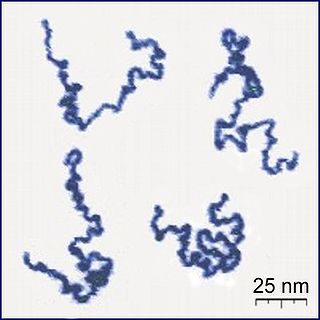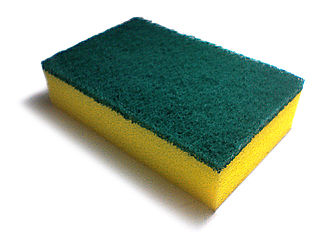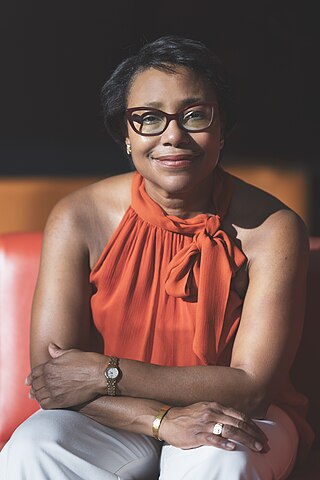
A polymer is a substance or material that consists of very large molecules, or macromolecules, that are constituted by many repeating subunits derived from one or more species of monomers. Due to their broad spectrum of properties, both synthetic and natural polymers play essential and ubiquitous roles in everyday life. Polymers range from familiar synthetic plastics such as polystyrene to natural biopolymers such as DNA and proteins that are fundamental to biological structure and function. Polymers, both natural and synthetic, are created via polymerization of many small molecules, known as monomers. Their consequently large molecular mass, relative to small molecule compounds, produces unique physical properties including toughness, high elasticity, viscoelasticity, and a tendency to form amorphous and semicrystalline structures rather than crystals.

Polyurethane refers to a class of polymers composed of organic units joined by carbamate (urethane) links. In contrast to other common polymers such as polyethylene and polystyrene, polyurethane term does not refer to the single type of polymer but a group of polymers. Unlike polyethylene and polystyrene polyurethanes can be produced from a wide range of starting materials resulting various polymers within the same group. This chemical variety produces polyurethanes with different chemical structures leading to many different applications. These include rigid and flexible foams, and coatings, adhesives, electrical potting compounds, and fibers such as spandex and polyurethane laminate (PUL). Foams are the largest application accounting for 67% of all polyurethane produced in 2016.

In materials science, a thermosetting polymer, often called a thermoset, is a polymer that is obtained by irreversibly hardening ("curing") a soft solid or viscous liquid prepolymer (resin). Curing is induced by heat or suitable radiation and may be promoted by high pressure or mixing with a catalyst. Heat is not necessarily applied externally, and is often generated by the reaction of the resin with a curing agent. Curing results in chemical reactions that create extensive cross-linking between polymer chains to produce an infusible and insoluble polymer network.

Plastic recycling is the processing of plastic waste into other products. Recycling can reduce dependence on landfill, conserve resources and protect the environment from plastic pollution and greenhouse gas emissions. Recycling rates lag behind those of other recoverable materials, such as aluminium, glass and paper. From the start of plastic production through to 2015, the world produced around 6.3 billion tonnes of plastic waste, only 9% of which has been recycled and only ~1% has been recycled more than once. Of the remaining waste, 12% was incinerated and 79% was either sent to landfills or lost to the environment as pollution.
Shape-memory polymers (SMPs) are polymeric smart materials that have the ability to return from a deformed state to their original (permanent) shape when induced by an external stimulus (trigger), such as temperature change.
Thermoplastic polyurethane (TPU) is any of a class of polyurethane plastics with many properties, including elasticity, transparency, and resistance to oil, grease, and abrasion. Technically, they are thermoplastic elastomers consisting of linear segmented block copolymers composed of hard and soft segments.

Plastics are a wide range of synthetic or semi-synthetic materials that use polymers as a main ingredient. Their plasticity makes it possible for plastics to be molded, extruded or pressed into solid objects of various shapes. This adaptability, plus a wide range of other properties, such as being lightweight, durable, flexible, and inexpensive to produce, has led to their widespread use. Plastics typically are made through human industrial systems. Most modern plastics are derived from fossil fuel-based chemicals like natural gas or petroleum; however, recent industrial methods use variants made from renewable materials, such as corn or cotton derivatives.

Paula Therese Hammond is an Institute Professor and the Vice Provost for Faculty at the Massachusetts Institute of Technology (MIT). She was the first woman and person of color appointed as head of the Chemical Engineering department. Her laboratory designs polymers and nanoparticles for drug delivery and energy-related applications including batteries and fuel cells.
Karen L. Wooley is an American polymer chemist. She is a Distinguished Professor at Texas A&M University whose research focuses on developing novel polymers and nanostructured materials. Previously, she was the James S. McDonnell Distinguished University Professor in Arts & Sciences at Washington University in St. Louis.
Nancy Sottos is an American materials scientist and professor of engineering. She is the Swanlund Endowed Chair and the head of the Department of Materials Science and Engineering at the University of Illinois at Urbana–Champaign. She is also a co-chair of the Molecular and Electronic Nanostructures Research Theme at the Beckman Institute for Advanced Science and Technology. She heads the Sottos Research Group.
Anna Christina Balazs is an American materials scientist and engineer. She currently is Distinguished Professor at the University of Pittsburgh and holds the John A. Swanson Chair at the Swanson School of Engineering.
Jodie L. Lutkenhaus is a Professor of Chemical Engineering at Texas A&M University who develops redox active polymers for energy storage and smart coatings. In 2019 Lutkenhaus and Karen L. Wooley demonstrated the world's first biodegradable peptide battery. Lutkenhaus is a World Economic Forum Young Scientist.

Benny D. Freeman is a United States chemical engineering professor at The University of Texas at Austin. He received his B.S. in Chemical Engineering from NC State University in 1983 and his Ph.D. in Chemical Engineering from the University of California, Berkeley in 1988. Afterwards, during 1988–89, he served as a NATO Postdoctoral Fellow at the Ecole Supérieure de Physique et de Chimie Industrielles de la Ville de Paris in the Laboratoire Physico-Chimie Structurale et Macromoléculaire, Paris, France. He then returned to his undergraduate Alma Mater, NC State, where he served on the chemical engineering faculty from 1989–2001. In 2001, he moved to The University of Texas at Austin where, today, he serves as the William J. (Bill) Murray Jr. Endowed Chair in Engineering in the chemical engineering department.

Thomas H. Epps, III is an American chemist and the Thomas & Kipp Gutshall Professor of Chemical & Biomolecular Engineering at the University of Delaware. He has a joint appointment in Materials Science & Engineering, and an affiliated appointment in Biomedical Engineering. He serves as the director of the Center for Research in Soft Matter & Polymers, the director of the Center for Hybrid, Active, and Responsive Materials, and the co-director of the Center for Plastics Innovations. His research considers the design, synthesis, characterization, and application of nanostructure-containing polymers related to biobased materials, drug delivery, alternative energy (batteries), nanotemplating, and composite-based personal-protective equipment. He is also the co-founder of Lignolix, which is focused on the valorization of biomass waste.
Arthi Jayaraman is an Indian-American scientist who is the Centennial Term Professor for Excellence in Research and Education at the University of Delaware. Her research considers the development of computational models to better understand polymer nanocomposites and biomaterials. Jayaraman was elected Fellow of the American Physical Society in 2020.
Linda Jean Broadbelt is an American chemical engineer who is the Sarah Rebecca Roland Professor and associate dean for research of the McCormick School of Engineering and Applied Science at Northwestern University. Her research considers kinetics modeling, polymerization and catalysis.
Surita Bhatia is an American chemist who is professor and vice provost of faculty affairs at Stony Brook University. Her work considers the structure of soft materials, including polymeric hydrogels and colloidal glasses. She was elected Fellow of the American Institute of Chemical Engineers, the American Institute for Medical and Biological Engineering and the Society of Rheology in 2020.

Christoph Weder is the former director of the Adolphe Merkle Institute (AMI) at the University of Fribourg, Switzerland, and a professor of polymer chemistry and materials. He is best known for his work on stimuli-responsive polymers, polymeric materials that change one or more of their properties when exposed to external cues. His research is focused on the development, investigation, and application of functional materials, in particular stimuli-responsive and bio-inspired polymers.
Covalent adaptable networks (CANs) are a type of polymer material that closely resemble thermosetting polymers (thermosets). However, they are distinguished from thermosets by the incorporation of dynamic covalent chemistry into the polymer network. When a stimulus (for example heat, light, pH, ...) is applied to the material, these dynamic bonds become active and can be broken or exchanged with other pending functional groups, allowing the polymer network to change its topology. This introduces reshaping, (re)processing and recycling into thermoset-like materials.
Stuart L. Cooper is an American engineer. As a Full Professor and Chair of Ohio State University's Department of Chemical and Biomolecular Engineering, Cooper was elected to the National Academy of Engineering in 2011.









